This post will contain spoilers for
My Hero Academia
Plus Ultra, Fantasy and Fiction fans!
My Hero Academia has so much going for it: excellent worldbuilding, an entertaining cast, memorable character designs—not to mention the funny but well-developed super powers. It’s a fun watch and remains one of my favorite super hero shows.
Of course, it’s not without its flaws. The show’s greatest struggle is its lack of meaningful consequences. Big battles hardly ever end in lingering injuries or deaths. The show constantly teases tremendous trials for its characters, but these struggles tend to leave everyone unscathed. While the show has improved on this a bit since season three, the issue does persist.
Many people are willing to criticize a show if it constantly teases “death scares” that it never follows through on. And this criticism is fair; there’s a lot of damage that a show can do by not having any lasting repercussions. Suspenseful battles become boring if the viewer knows everyone will make it out okay in the end. And fans lose interest in plots where the characters’ actions won’t end up making a difference.
But for a great example of why consequences matter, look no further than My Hero Academia’s Tenya Iida.
Who Is Tenya Iida?
Iida is the straight-laced, overly-responsible, by-the-books friend of series protagonist Izuku Midoriya. It’s not an uncommon character type, but My Hero Academia author Kohei Horikoshi uses this archetype to introduce Iida in a masterful reversal of expectations.
We first meet Iida just before the UA High entry exam. During the exam briefing, Iida interrupts the instructor—a well-known hero—pointing out what looks to be a typo in the presentation. He loudly proclaims that he’d hoped an establishment as prestigious as UA would have made sure not to have any errors in its curriculum.
Oh no, you think. He’s going to be one of those people.
Iida continues to live up to this first impression, repeatedly scolding and putting down Midoriya before the exam. But as soon as he sees Midoriya’s courage in action—surpassing even his own well-groomed heroic skills—Iida’s outlook shifts. He apologizes to Midoriya, proclaiming he was in the wrong just as loudly as he’d criticized the exam briefing. He humbly confesses Midoriya’s superior judgment and selflessness, and it’s implied he hopes to learn more from Midoriya in the future.
How ironic, then, that Iida’s character arc failed to reach its full potential.
Iida’s Arc
Principled characters shine brightest when their beliefs are challenged, such as when the Joker tests Commissioner Gordon in the lauded The Killing Joke.
It’s a character’s reaction to extreme circumstances that results in a suspenseful and satisfying exploration of the depth of their character. Will they fall to their own fallible human tendencies, or will they stand for what’s right?
| Funimation 2016-2021 |
Iida is set up for this kind of impactful character arc in season two. During the UA High Sports Festival, Iida receives word that his brother was seriously injured by a villain called the Hero-Killer, Stain. This news shakes Iida to the core; his brother, his idol and greatest inspiration, is in the hospital and may never be able to walk again. Iida’s normally optimistic nature quickly crumbles into concern and anger. To see a normally so logical character consumed by anger is shocking, and a cause for concern both for viewers and for Midoriya.
In a scene of painful foreshadowing, Midoriya as the future narrator voices his regret that he didn’t say anything to Iida to address these concerns. “At that time, I should have been more emphatic. Because I would eventually regret what happened on that day.”1
So when we learn Iida has discovered the whereabouts of the Hero-Killer, we know something terrible is about to happen.
Iida tracks down and confronts Stain, attacking him in wrath. Even Stain comments on this, chastising Iida. “Your eyes… Are you here for vengeance?2 …Being taken in by the hatred before you and trying to fulfill your own desires… That is the furthest from what a hero should be.”3 Stain recognizes this behavior as un-heroic and intends to punish Iida for his sins.
Even Iida realizes that Stain was right. Iida’s attack was no temporary moment of weakness; it was premeditated. Iida had consciously hunted Stain, applying to an internship solely to track down the hero-killer and avenge his brother. Iida wasn’t taking down a threat to society to protect others; he was out for revenge for his fallen hero.
I was thrilled watching this scene. Stain’s attack had pushed even the normally cool-headed, principled Iida to give into his hatred, even breaking the law in the process. Now he would have to deal with the repercussions of those choices, not just for himself but also for his family. How would they react to their son failing to uphold the legacy of a hero?
Unfortunately, it was a question I’d never get an answer to. Because the repercussions of Iida’s choice were almost immediately brushed under the rug.
A Meaningless Lesson
Iida suffered almost no long-term physical consequences of his poor judgment. While his arm was injured and doctors explained this might result in permanent numbness—it has offered him no setbacks as of halfway through season five.
As frustrating as this lack of physical consequences was, it was nowhere near as frustrating as the lack of emotional or social consequences.
For instance, we never get to see Iida’s family react to his attack on Stain. Were they simply kept in the dark, just like the rest of the public was? Either way, we never see tension among his family or for his family because of Iida’s actions. In addition to attacking Stain out of vengeance, Iida had broken the law by using his quirk in public without proper licensure. This was a serious violation that should have dramatically impacted Iida and his family. How could he possibly earn his family’s trust back? How could he have undone the damage he’d done to their family reputation, even if the public was kept in the dark about it? This family tension would have been a great burden and challenge for Iida.
Not only was Iida robbed of an opportunity for an interesting struggle to regain his family’s trust and respect, he was also robbed of the chance to grow by wrestling with his inner demons.
Iida’s desire to avenge his brother had no meaningful repercussions on his character.
There is almost no mention of how Iida suffers from self-doubt or concern after the fight with Stain is resolved. The only glimpse we see that Iida has given the matter a second thought is one point in season three where Iida cautions Midoriya not to break the rules and go after the incredibly powerful All For One.
While this scene initially seems like a poignant reminder of the anguish Iida went through with Stain, it ultimately means nothing.
For one, there were really no negative repercussions for Iida after this choice. His arm injury had healed and never inhibited him in any way. His family had no shown reaction to his choices. And he was protected from legal repercussions by the police force. Iida doesn’t even suggest he’s been haunted by his choice to fight Stain, as he hardly reflects on his choice at all.
Iida’s caution also means nothing because it doesn’t do anything. Even after Iida pipes in, Midoriya still breaks the rules and goes after All For One, which ends up paying off in the end, because they’re able to rescue Bakugo from the villain. There was really no reason for Iida to impart this lesson, because the show itself says it’s the wrong lesson. There is no negative consequence to breaking the rules; in fact, the students going off on their own to assist is regularly rewarded.
This leaves Iida’s life-changing decision to go after Stain feeling pointless, as it doesn’t affect his character or the story at all.
Shadow of His Former Self
The lack of consequences ends up stripping Iida of all depth. As of the time of posting this article, Iida has been a shadow of his former self since season three: the butt of jokes, the goofy class representative, with none of the nuance set up throughout seasons one and two. Gone is the complex Iida who had more going for him than his commanding hyper responsibility. Now all he does is try to herd his fellow students along while no one pays attention to him because “Oh, it’s just Iida.”
This is a tragic waste of what had been a complex, surprising character.
After his experience with Stain, Iida could have—and should have—been driven to his lowest, darkest point. Dealing with the possible loss of his idol was one thing, but having to work through his broken relationship with his family would have crushed Iida. Add to that his internal struggle: fear that he had destroyed all hopes of becoming a noble hero like his brother. The guilt and shame of letting his family down would mingle with crippling self-doubt. Would the villain lurking inside him escape again? What would he do then? Should he forever walk away from hero work, forsake his dream, for fear that he couldn’t contain the monster inside him? Should he face his fears head-on and persevere? Could he, after falling so far?
While there’s great value in seeing a character stand firm in their beliefs, it can be equally interesting to watch a character fail to uphold their convictions and see how they deal with those consequences. A character who is tempted, gives into temptation, and still has the strength to try again is one I find incredibly compelling, and one that would have perfectly pushed Iida’s character growth. It would have been a satisfying extension of his initial depiction of being more than what he seemed, and it would have made him an interesting mentor for Midoriya to learn from.
Imagine a scene where a fallen and redeemed Iida is the one who grabs Midoriya’s arm to keep him from doing anything reckless against All For One. Imagine the pain in Iida’s eyes as he sees Midoriya about to make the same mistake he had. The Iida who, with one choice, had lost the respect of his family, ruined the legacy of his hero name, and nearly destroyed his dream. The Iida who then picked himself back up and put his life together again, piece by painful piece. Imagine Midoriya looking back at him, at Iida, who’d been the pillar of trust and respectability, who had fallen so far, but who was back on the path of redemption.
That’s a meaningful moment I wish we could have seen. That’s a moment we could have had, if only Iida had experienced that life-changing moment Midoriya suggested he would.
Iida began as a complex character, but his life-changing moment was stripped of its power, leaving Iida a hollowed shell of his former self—his complexity sanded away by lack of consequences. He was never allowed to process and rise above his failings in order to become a more well-rounded, mature hero.
And this is the true tragedy of Tenya Iida.
—
Notes and References:
- My Hero Academia, “Bizarre! Gran Torino Appears,” Season 2, Episode 14, Directed by Yuji Oya, Written by Yosuke Kuroda, November 24, 2018, Funimation.
- My Hero Academia, “Hero Killer: Stain vs U.A. Students,” Season 2, Episode 16, Directed by Hitomi Ezoe and Sayaka Ikeda, Written by Yosuke Kuroda, December 8, 2018, Funimation.
- My Hero Academia, “Climax,” Season 2, Episode 17, Directed by Satoshi Takafuji, Written by Yosuke Kuroda, December 15, 2018, Funimation.
All photos are screenshots taken from VRV.co and Funimation.com and are the property Funimation 2016-2021. Used under US “Fair Use” laws.
My Hero Academia and all related terms are the property of Funimation. And I am not affiliated with them.

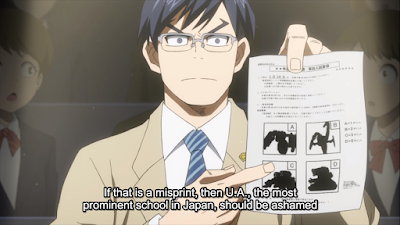
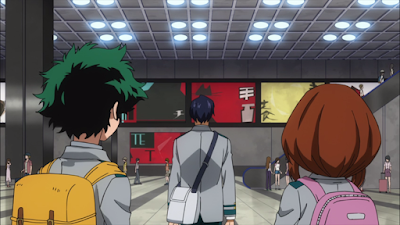

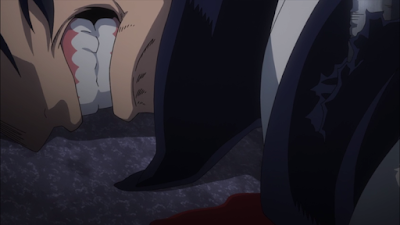
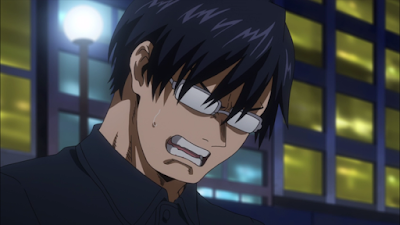

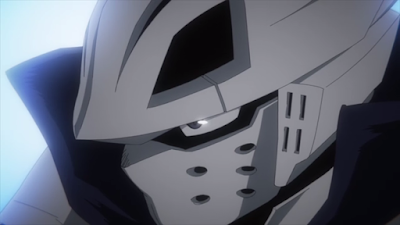
Leave a Reply